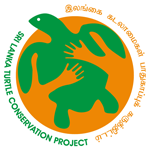
One of the major problems facing third-world countries is the lack of alternative livelihood options, especially for those who depend upon marine and coastal resources destructively. In recognition of the fact that sustainable turtle conservation cannot meet its desired expectations without paying attention to the issues and sustainable livelihoods of the coastal recourse dependant poor communities, the TCP has initiated a series of programs to provide alternative income to coastal community members within the projected areas, who depend on marine and coastal resources destructively.
Likewise, one of the sole aims of the TCP is to seek ways of providing alternative income generation activities for those who are inextricably linked with the coastal resources as a source of their income, while resuming necessary steps to ensure sustainable conservation of the marine turtles together with other important coastal ecosystems.
These programs entailed different types of activities such as,
- Women Batik Group
- Women Sewing Group
- Women Coir/coir mat group
- Turtle Nest Protectors
- Trainers
- Tourist Guides
- Research Assistants
- Ornamental fish breeding Group
- Cement brick-making Group
- Fishing gear and fishing vessels
- Crab pods
- Maintenance of Mangrove and coastal plant nurseries
TCP has and is being carried out all these activities where its projects are implemented, like Kosgoda, Rekawa, Kalpitiya, and so forth.
Women Batik Group
In creating women’s batik groups, TCP first selected the interested women group and assisted them with necessary training on batik production. This has enabled the batik group to improve their knowledge in many areas of batik production and ultimately develop it into self-employment. TCP is responsible for the provision of necessary equipment and materials to proceed with the activity, finding local markets, and sometimes the TCP itself purchases the finished products. If the group needed any financial assistants, it can be fulfilled through the revolving fund schemes initiated in community-based organizations (CBOs).
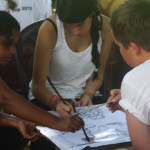
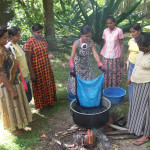
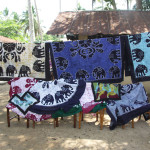
Women Sewing Group
As in the above, the TCP selected about 20 to 30 women who were interested in tailoring and above all conducted training programs on tailoring for the selected group of women. Sewing machines and other required raw materials like clothes, threads, bristol boards, and desks are provided to either the top ten performers during the training period or through CBOs of the area.
Generally, the training period is about 6 months and during this training, the participants are paid a small incentive of about 300 rupees including refreshments on monthly basis. Participants who have completed the training are in a position to convert their knowledge into self-learning to help their families.
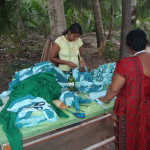
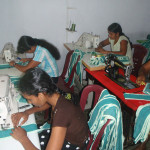
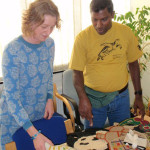
Women Coir group
In selecting the women’s choir group too, TCP followed the same procedure as in the batik and sewing groups. Training programs were conducted for interested women to produce creatively designed coir products such as floor mats, wall hangers, ornaments, and other various products utilizing different techniques of colour mixing. Provision of necessary equipment, raw materials, machines, funds (through revolving fund scheme), and also TCP sought for markets to sell their products since the market for coir comes in one period per year. In some instances, the TCP would select some groups and help them to start a career in mat production by providing them with the necessary raw materials.
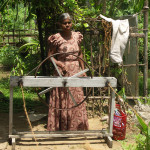
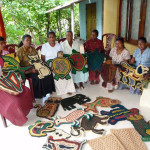
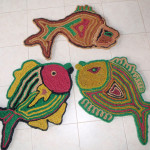
Turtle Nest Protectors
The most prestigious conservation activity of the TCP is the in-situ turtle nest protection. To facilitate and attain sustainable conservation of the marine turtle and their habitats, TCP has taken necessary measures to employ former egg poachers as nest protectors (NPS). These nest protectors were given training on nest protection and management. NPS are responsible for 24-hour beach patrolling to protect the nests from being predated by humans (collection of marine turtle eggs) and non-human activities. As a result of employing these people as nest protectors, they can make their living and support their families and on the other hand, TCP was able to successfully continue the in-situ nest protection program. These former egg poachers have been very much motivated by their new title and they have been able to face society as responsible people.
For instance, in Rekawa TCP employed 20 community members as turtle nest protectors while in Kosgoda 15 community members were engaged as nest protectors.
Trainers
As a component of the educational and awareness programs that were convened by the TCP, the building of primary schools took a vital aspect.
Tourist Guides
TCP trained locals as ‘tourist guides’ and provided a certificate and Government license from Sri Lanka Tourist Board. Currently, TCP is dependent on the “Turtle Night Watch” nature tourism program, which was conducted in Rekawa. The appointed tourist guides provide their service to the tourists who visit the TCP’s “Turtle Night Watch” in Kosgoda, thereby making their income.
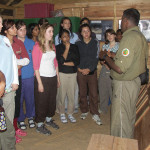
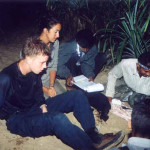
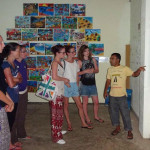
Research Assistants
Some of the local community members were trained in research and conservation techniques and employed as Research Assistants to facilitate the collection of biometric data on the nesting turtles. These research assistants play an active part in the project. Research assistants or research officers (RSS) regularly engage in patrolling the beach throughout the day and the night is dedicated to the collection of data.
Cement Brick Making Programme
To help improve the standard of living among deprived community members, cement brick-making machines were purchased and distributed by TCP to those who needed or requested those. The installation of these machines was completed by the TCP. On some occasions, the TCP either hands over these machines to the members of the CBOs on a revolving fund scheme or CBOs maintain the machines and employ community members to use them.
Distribution of Fishing Gear and Fishing Vessels
Most of the community members of the TCP project areas make their living through fishing. But some of the fishermen have to rent vessels for fishing and this has not enabled them to better their earnings. Hence, TCP was actively engaged in purchasing fishing vessels (teppan) and distributed them amongst the member fishermen of CBOs. The CBO then distributed the vessels among their members as a loan. Members must pay this back in instalments. When all the instalments are completed, the CBO will purchase another vessel, to be distributed to another member. Over time, all members will privately own a fishing vessel, which will lead to an increase in income from fishing.
Crab Pods
To promote the economic and social development of the community members who are economically deprived, by helping and encouraging the community members to engage in preferential employment (environmentally friendly), the TCP produced crab-farming pods in Puttlam lagoon. Those pods were given to CBOs and members of these CBOs were trained on crab farming.
This has proved a great success. Besides providing a source of income, it has enabled community members to become empowered through training and also able to cement the good relationship between the community and the environment.
Maintenance of Mangroves and Coastal Plant Nurseries
Apart from taking measures to conserve turtles, the TCP also engaged in promoting other coastal habitats. Among these, the propagation of the mangroves and other coastal plants where it is necessary took an important part. All the plants were firstly maintained in nurseries. Community members were appointed to maintain these nurseries and a considerable incentive was paid to the maintainers.
Ornamental Fish Breeding Programme in Rekawa
As a source of provision of an alternative income for community members in Rekawa, the TCP implemented an ornamental fish breeding program. Under this project, the interested community members were selected and they were provided with training on fish breeding, constructing, and arraigning of fish tanks. The sole aim of this program was to make the community members get involved in the local and foreign markets (exporting the fish) and thereby own a sustainable income for their living.
